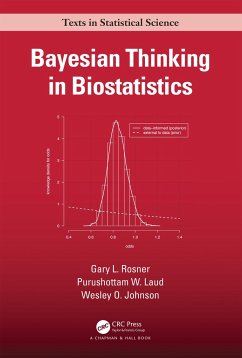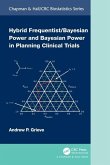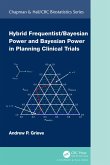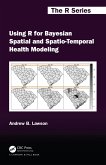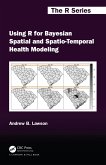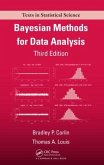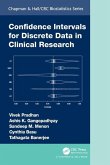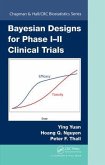With discussions on many recent developments in Bayesian methodologies, An Introduction to Bayesian Biostatistics considers statistical issues in biomedical research, allowing for greater collaborations between biostatisticians and biomedical researchers. The text presents biostatistical methods from a Bayesian perspective. It includes an overview of Bayesian statistics, a discussion of rates and proportions with applications in clinical and other population-based studies, recent developments in clinical trial design, methods for evaluating censored data and diagnostic tests, and problems resulting from multiple comparisons.
Praise for Bayesian Thinking in Biostatistics:
"This thoroughly modern Bayesian book ...is a 'must have' as a textbook or a reference volume. Rosner, Laud and Johnson make the case for Bayesian approaches by melding clear exposition on methodology with serious attention to a broad array of illuminating applications. These are activated by excellent coverage of computing methods and provision of code. Their content on model assessment, robustness, data-analytic approaches and predictive assessments...are essential to valid practice. The numerous exercises and professional advice make the book ideal as a text for an intermediate-level course..."
-Thomas Louis, Johns Hopkins University
"The book introduces all the important topics that one would usually cover in a beginning graduate level class on Bayesian biostatistics. The careful introduction of the Bayesian viewpoint and the mechanics of implementing Bayesian inference in the early chapters makes it a complete self- contained introduction to Bayesian inference for biomedical problems....Another great feature for using this book as a textbook is the inclusion of extensive problem sets, going well beyond construed and simple problems. Many exercises consider real data and studies, providing very useful examples in addition to serving as problems."
- Peter Mueller, University of Texas
With a focus on incorporating sensible prior distributions and discussions on many recent developments in Bayesian methodologies, Bayesian Thinking in Biostatistics considers statistical issues in biomedical research. The book emphasizes greater collaboration between biostatisticians and biomedical researchers. The text includes an overview of Bayesian statistics, a discussion of many of the methods biostatisticians frequently use, such as rates and proportions, regression models, clinical trial design, and methods for evaluating diagnostic tests.
Key Features
Applies a Bayesian perspective to applications in biomedical science
Highlights advances in clinical trial design
Goes beyond standard statistical models in the book by introducing Bayesian nonparametric methods and illustrating their uses in data analysis
Emphasizes estimation of biomedically relevant quantities and assessment of the uncertainty in this estimation
Provides programs in the BUGS language, with variants for JAGS and Stan, that one can use or adapt for one's own research
The intended audience includes graduate students in biostatistics, epidemiology, and biomedical researchers, in general
Authors
Gary L. Rosner is the Eli Kennerly Marshall, Jr., Professor of Oncology at the Johns Hopkins School of Medicine and Professor of Biostatistics at the Johns Hopkins Bloomberg School of Public Health.
Purushottam (Prakash) W. Laud is Professor in the Division of Biostatistics, and Director of the Biostatistics Shared Resource for the Cancer Center, at the Medical College of Wisconsin.
Wesley O. Johnson is professor Emeritus in the Department of Statistics as the University of California, Irvine.
Praise for Bayesian Thinking in Biostatistics:
"This thoroughly modern Bayesian book ...is a 'must have' as a textbook or a reference volume. Rosner, Laud and Johnson make the case for Bayesian approaches by melding clear exposition on methodology with serious attention to a broad array of illuminating applications. These are activated by excellent coverage of computing methods and provision of code. Their content on model assessment, robustness, data-analytic approaches and predictive assessments...are essential to valid practice. The numerous exercises and professional advice make the book ideal as a text for an intermediate-level course..."
-Thomas Louis, Johns Hopkins University
"The book introduces all the important topics that one would usually cover in a beginning graduate level class on Bayesian biostatistics. The careful introduction of the Bayesian viewpoint and the mechanics of implementing Bayesian inference in the early chapters makes it a complete self- contained introduction to Bayesian inference for biomedical problems....Another great feature for using this book as a textbook is the inclusion of extensive problem sets, going well beyond construed and simple problems. Many exercises consider real data and studies, providing very useful examples in addition to serving as problems."
- Peter Mueller, University of Texas
With a focus on incorporating sensible prior distributions and discussions on many recent developments in Bayesian methodologies, Bayesian Thinking in Biostatistics considers statistical issues in biomedical research. The book emphasizes greater collaboration between biostatisticians and biomedical researchers. The text includes an overview of Bayesian statistics, a discussion of many of the methods biostatisticians frequently use, such as rates and proportions, regression models, clinical trial design, and methods for evaluating diagnostic tests.
Key Features
Applies a Bayesian perspective to applications in biomedical science
Highlights advances in clinical trial design
Goes beyond standard statistical models in the book by introducing Bayesian nonparametric methods and illustrating their uses in data analysis
Emphasizes estimation of biomedically relevant quantities and assessment of the uncertainty in this estimation
Provides programs in the BUGS language, with variants for JAGS and Stan, that one can use or adapt for one's own research
The intended audience includes graduate students in biostatistics, epidemiology, and biomedical researchers, in general
Authors
Gary L. Rosner is the Eli Kennerly Marshall, Jr., Professor of Oncology at the Johns Hopkins School of Medicine and Professor of Biostatistics at the Johns Hopkins Bloomberg School of Public Health.
Purushottam (Prakash) W. Laud is Professor in the Division of Biostatistics, and Director of the Biostatistics Shared Resource for the Cancer Center, at the Medical College of Wisconsin.
Wesley O. Johnson is professor Emeritus in the Department of Statistics as the University of California, Irvine.
"This thoroughly modern Bayesian book by leaders in developing and applying Bayesian methods is a "must have" as a textbook or a reference volume. Rosner, Laud and Johnson make the case for Bayesian approaches by melding clear exposition on methodology with serious attention to a broad array of illuminating applications. These are activated by excellent coverage of computing methods and provision of code. Their content on model assessment, robustness, data-analytic approaches and predictive assessments (these pioneered by Seymour Geisser) are essential to valid practice. The numerous exercises and professional advice make the book ideal as a text for an intermediate-level course for aspiring statisticians, domain scientists and policy researchers."
-Thomas Louis, Johns Hopkins University
"The book introduces all the important topics that one would usually cover in a beginning graduate level class on Bayesian biostatistics. The careful introduction of the Bayesian viewpoint and the mechanics of implementing Bayesian inference in the early chapters makes the it a complete self contained introduction to Bayesian inference for biomedical problems. As a natural consequence of the biostatistics target audience all methods and discussions are well motivated by specific inference problems as they arise in biomedical research. Even without this target audience in mind, the same motivating problems would be a great pedagogical choice to keep discussion focused and to make many modeling and inference choices intuitively appealing. Overall the authors have made well informed choices about including material and topics, and about the level of details of some of the formal presentation, fittingly leaving some details to references. Another great feature for using this book as a textbook is the inclusion of extensive problem sets, going well beyond construed and simple problems. Many exercises consider real data and studies, providing very useful examples in addition to serving as problems. In summary, the book is a great introduction to Bayesian inference for readers with an interest in biomedical applications, but who do not necessarily have a formal biostatistics background.
- Peter Mueller, University of Texas
-Thomas Louis, Johns Hopkins University
"The book introduces all the important topics that one would usually cover in a beginning graduate level class on Bayesian biostatistics. The careful introduction of the Bayesian viewpoint and the mechanics of implementing Bayesian inference in the early chapters makes the it a complete self contained introduction to Bayesian inference for biomedical problems. As a natural consequence of the biostatistics target audience all methods and discussions are well motivated by specific inference problems as they arise in biomedical research. Even without this target audience in mind, the same motivating problems would be a great pedagogical choice to keep discussion focused and to make many modeling and inference choices intuitively appealing. Overall the authors have made well informed choices about including material and topics, and about the level of details of some of the formal presentation, fittingly leaving some details to references. Another great feature for using this book as a textbook is the inclusion of extensive problem sets, going well beyond construed and simple problems. Many exercises consider real data and studies, providing very useful examples in addition to serving as problems. In summary, the book is a great introduction to Bayesian inference for readers with an interest in biomedical applications, but who do not necessarily have a formal biostatistics background.
- Peter Mueller, University of Texas

